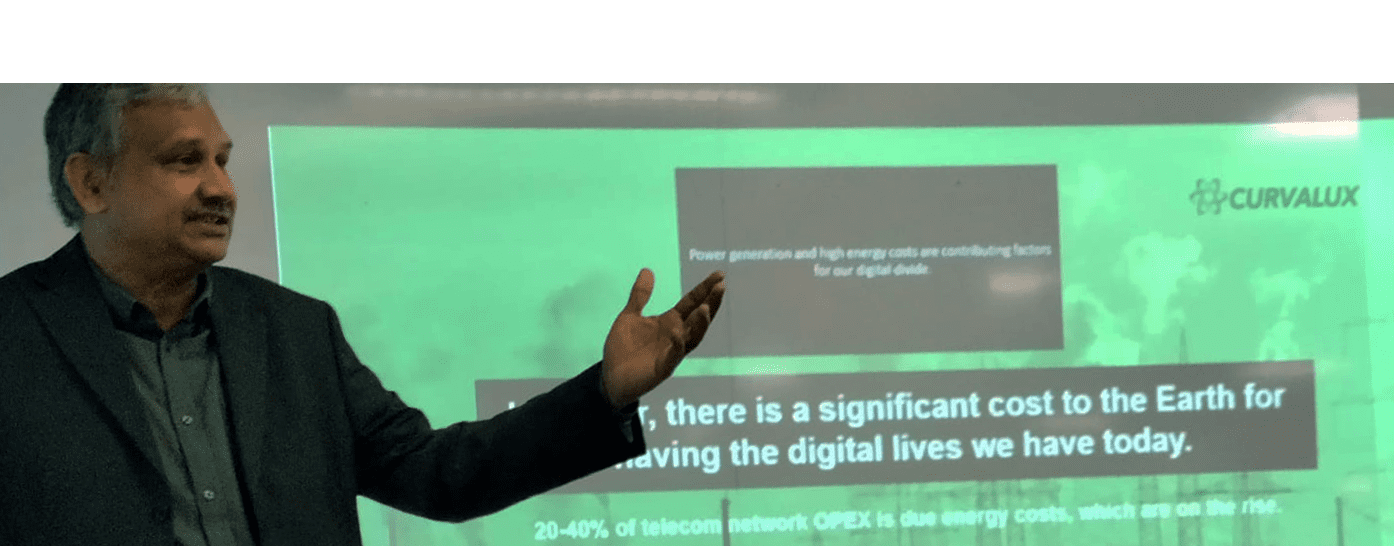Making a significant difference in the world by paving the way for a more sustainable future.
Dr. Junaid Syed, Senior Vice President of Engineering and Operations at Curvalux recently gave the keynote speech at The University of West Scotland’s 23rd Annual Symposium, Digital Connectivity and Innovation for Sustainable Futures.
 His theme, “Innovate to Create Value and Generate Profit,” conveyed to the audience the message that fostering innovation and commercializing sustainable, energy-efficient solutions, especially in today’s environmentally conscious economy, can significantly impact not only a company’s profitability but also the well-being of our planet.
His theme, “Innovate to Create Value and Generate Profit,” conveyed to the audience the message that fostering innovation and commercializing sustainable, energy-efficient solutions, especially in today’s environmentally conscious economy, can significantly impact not only a company’s profitability but also the well-being of our planet.
The emergence of a circular economy.
With the increasing adoption of sustainable manufacturing processes, Dr. Syed noted that, “We are witnessing the emergence of a circular economy. This shift in go-to-market strategies has opened up fresh avenues for minimizing our carbon footprint across the supply chain, as well as in design and manufacturing nodes.”
Dr. Syed’s message also carried on as a panelist of a subsequent roundtable discussion on the “Role of Digital Technologies for Sustainable Futures”. Dr. Syed had the privilege of joining fellow thought leaders from prestigious institutions such as NED University of Engineering and Technology, FAST National University, The University of Leeds, and The University of Sussex in the field of advanced wireless technology development.
A formidible challenge.
The central focus of this talk was the formidable challenge of connecting the world’s unconnected populations through sustainable means. During the discussion, Dr. Syed shed light on the pressing issues confronting half the global population who remain unconnected such as escalating energy costs, persistent power shortages, the environmental consequences of carbon emissions as well as many other limiting factors:
- Infrastructure Challenges: Many remote and underserved areas lack the necessary physical infrastructure, such as fiber-optic cables or cell towers, to establish reliable internet connections.
- Cost of Access: Internet service can be expensive, particularly in low-income regions, making it unaffordable for a significant portion of the population.
- Lack of Electricity: Reliable electricity is essential for internet access. Areas with irregular or no access to electricity face significant barriers to connectivity.
- Digital Literacy: Many individuals lack the skills and knowledge needed to use the internet effectively, limiting their ability to benefit from online resources.
- Regulatory Barriers: Some regions have restrictive regulations that hinder the expansion of internet services or limit competition among providers.
- Geographic Barriers: Geographic features like mountains, forests, or vast deserts can pose challenges to building infrastructure and establishing reliable connections.
- Language and Content: Language barriers and limited availability of content in local languages can limit internet adoption in certain areas.
- Security and Privacy Concerns: Concerns about online security and privacy can discourage people from using the internet.
- Political and Social Factors: Political instability, censorship, and social factors can hinder internet access and limit the free flow of information.
The discussion prompted numerous questions about the practicality of these sustainable manufacturing initiatives and the responsibilities of stakeholders involved. Dr. Syed highlighted the shared responsibility that academia, industry, and governments bear in championing sustainable solutions, especially in the context of developing nations.
Our guiding principle.
It’s a guiding principle that Dr. Syed passionately imparts to his fellow engineers at Curvalux, who play a pivotal role in delivering sustainable solutions to bridge the connectivity gap in projects implemented by Curvalux worldwide. “By intertwining these experiences”, adds Dr. Syed, “our collective commitment to delivering sustainable, energy-efficient solutions to developing nations emerges as a crucial message. It underscores the need for collaboration, innovation, and a shared vision among all stakeholders.”
Together, we can drive positive change and enable a more connected and sustainable future for all and bridge the connectivity gap.
###
The 23rd Annual Symposium, Digital Connectivity and Innovation for Sustainable Futures is sponsored by the British Council and organized by the University of West Scotland in the UK to connect experts and enthusiasts alike, all dedicated to addressing the pressing issue of climate change and finding innovative solutions. For more information, see https://sites.google.com/view/dcisf/home
For more information about Curvalux, Solar-Efficient Wireless Access Technologies, please visit https://curvalux.com
